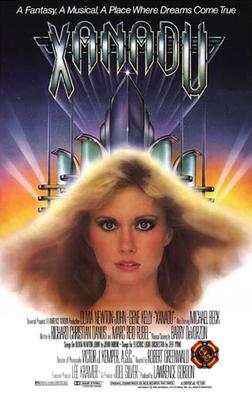
Xanadu (film)
Xanadu is a 1980 American musical fantasy film written by Richard Christian Danus and Marc Reid Rubel and directed by Robert Greenwald. The film stars Olivia Newton-John, Michael Beck and Gene Kelly in his final film role. It features music by Newton-John, Electric Light Orchestra, Cliff Richard and the Tubes. The title is a reference to the nightclub in the film, which takes its name from Xanadu, the summer capital of Kublai Khan's Yuan Dynasty in China. The city appears in Kubla Khan by Samuel Taylor Coleridge, an 1816 poem quoted in the film.
Xanadu was released in the United States on August 8, 1980 by Universal Pictures. A box-office disappointment, it earned negative critical reviews and was an inspiration (along with Can't Stop the Music) for the creation of the Golden Raspberry Awards to recognize the worst films of the year. Despite the film's lackluster performance, the soundtrack album became a great commercial success around the world and was certified double platinum in the United States. The song "Magic" was a U.S. number one hit for Newton-John, and the title track (by Newton-John and Electric Light Orchestra) reached number one in the United Kingdom and several other countries. The film has since become a cult classic for its mixture of 1940s music and culture with modern-day aesthetics.[3]
Plot[edit]
Sonny Malone is a struggling freelance artist in Los Angeles who has failed to find passion in his art. He tears one of his sketches and throws it into the wind, drifting toward a mural of nine sisters that suddenly comes alive. The sisters fly across Earth, but one of them roller skates through town and deliberately encounters Sonny. She kisses him before skating away, leaving him confused.
Returning to his old job of painting album-cover reproductions at AirFlo Records, Sonny is tasked with painting a reproduction for a group called the 9 Sisters. The cover shows the mysterious woman whom Sonny had met in front of an abandoned art deco-style auditorium. The photographer tells Sonny that the woman was not supposed to be on the cover but suddenly appeared in a few of his shots. After appearing in-person, Sonny tracks her across town to the same auditorium, where she introduces herself as Kira but refuses to reveal anything else about herself.
Sonny also meets and befriends Danny McGuire, a former big-band orchestra leader turned construction mogul. Danny was romantically involved with a singer in the 1940s who resembled Kira, and her departure resulted in his own loss of creative passion. Kira encourages Sonny and Danny to open a nightclub at the auditorium called Xanadu, and the two begin working together as partners. Sonny and Kira also slowly fall in love, culminating in a magically animated sequence. On the night before the club's opening, Kira confesses to Sonny that she is actually Terpsichore, one of the Nine Muses of Olympus. She was sent to inspire the creation of Xanadu, but she cannot stay despite their mutual feelings. Sonny becomes upset at the revelation, and Kira departs Earth having fulfilled her duty.
Danny tells Sonny to keep pursuing Kira, encouraging him to not abandon his dreams as Danny had done after his own muse left him. Sonny manages to enter Kira's home by roller skating into the muses' mural. Inside the realm of the gods, Sonny pleads with Kira's father Zeus to allow Kira to return to Earth, and Kira's sympathetic mother Mnemosyne attempts to influence Zeus. However, Zeus sends Sonny back to Earth. Kira professes her feelings for Sonny, and Zeus ultimately relents, allowing her to be with Sonny for "a moment, or maybe forever." Kira and the muses perform at the grand opening of the Xanadu club before returning to their realm. Sonny is initially saddened by their departure, but upon seeing a waitress with Kira's face, he starts a conversation with her.
The Muses
Members of the Tubes
The album grouped Olivia Newton-John's and ELO's songs on separate sides of the soundtrack album, and some songs heard in the film were excluded from the album. The following is the actual order in the film:
Release[edit]
Box office[edit]
The film underperformed at the box office, grossing only $23 million against a reported $20 million budget, a total that was insufficient to offset all related costs and return a profit.[2] The soundtrack album (UK #2, US #4), was a major hit. It was certified double platinum in the U.S. and gold in the UK, and also spent one week atop the Cash Box and Record World album charts.
Legacy[edit]
Cult following[edit]
Over the years, the film has developed a cult audience.[16]
Douglas Carter Beane, who wrote the book for the musical based on the film, later called Xanadu "what happens when you let straight men near the musical... I blame cocaine. It's like people say, 'When you hear Ray Charles play, you can hear the heroin?' When you watch Xanadu, you can see the cocaine up on the screen."[7]
In 2000, an unauthorized stage show titled Xanadu Live! was performed in Los Angeles, with actors speaking the film's dialogue and miming the songs.[7]